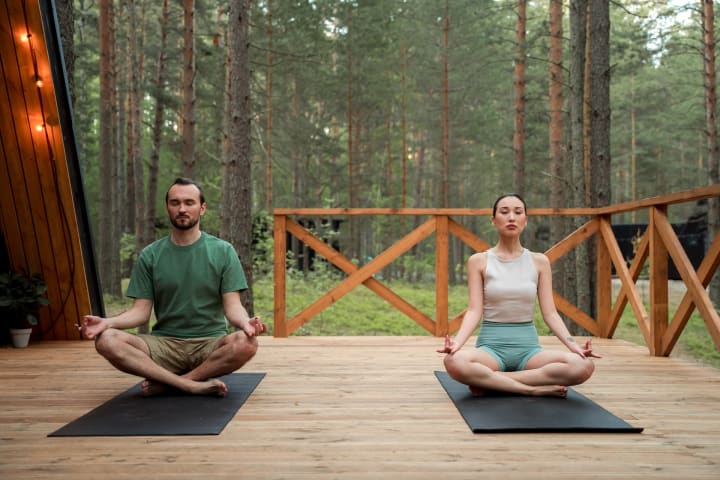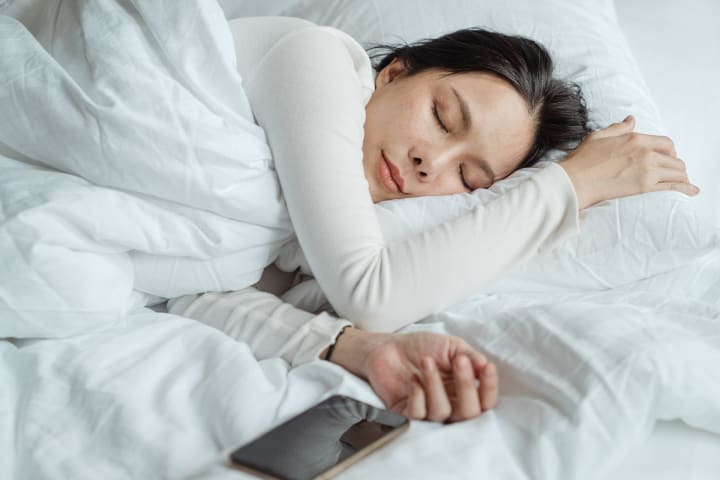10 Simple Tips for Reducing Stress in Your Daily Life
"Practical Strategies for Reducing Stress and Improving Your Daily Life"

Stress is an unavoidable part of our lives. We encounter it at work, at home, and even in our leisure activities. When left unmanaged, stress can lead to a variety of physical and mental health issues, including anxiety, depression, and chronic illness. Fortunately, there are many simple strategies you can use to reduce stress and improve your quality of life. In this article, we will discuss ten effective tips for reducing stress in your daily life.
1. Practice Mindfulness Meditation
"Mindfulness meditation is a practice that involves focusing your attention on the present moment, without judgment. Research has shown that mindfulness meditation can reduce stress, anxiety, and depression, as well as improve mood, cognitive function, and overall well-being. To get started with mindfulness meditation, find a quiet and comfortable place to sit, close your eyes, and focus on your breath. If your mind wanders, gently bring it back to your breath."

Mindfulness meditation is a simple yet powerful technique for reducing stress and improving overall well-being. It involves focusing your attention on the present moment, without judgment or distraction.
To practice mindfulness meditation, find a quiet and comfortable place to sit. Close your eyes and focus on your breath, observing each inhale and exhale without trying to control it. If your mind wanders, gently bring your attention back to your breath.
Research has shown that regular mindfulness meditation can lower cortisol levels, reduce anxiety and depression, and improve sleep quality. It can also help you develop greater self-awareness and compassion for yourself and others.
Incorporating mindfulness meditation into your daily routine can be as simple as setting aside just a few minutes each day to practice. Whether it's in the morning, during a break at work, or before bed, taking time to cultivate mindfulness can help you reduce stress and improve your overall well-being.
2. Exercise Regularly
"Exercise is one of the most effective ways to reduce stress. Physical activity releases endorphins, which are natural mood-boosting chemicals in the brain. Exercise also helps to lower cortisol levels, which is the stress hormone. To get the most benefits from exercise, aim for at least 30 minutes of moderate-intensity activity, such as brisk walking, cycling, or swimming, most days of the week."

Exercise is a well-known stress-buster, and for good reason. Physical activity releases endorphins, the body's natural feel-good chemicals, which can improve mood and reduce stress levels.
Regular exercise can also help you sleep better, boost your energy levels, and improve your overall health. It doesn't have to be a high-intensity workout, either; even a simple 20-minute walk can have a positive impact on your stress levels.
Incorporating exercise into your daily routine can be as simple as taking the stairs instead of the elevator, going for a walk during your lunch break, or joining a fitness class. The key is to find activities that you enjoy and that fit your schedule.
If you're new to exercise, start slowly and gradually increase your activity level over time. Aim for at least 30 minutes of moderate-intensity exercise most days of the week, and don't forget to consult with your healthcare provider before starting any new exercise program.
Incorporating regular exercise into your routine can have a significant impact on your stress levels, mood, and overall health. So, get moving and start reaping the benefits of physical activity!
3. Get Enough Sleep
"Getting enough sleep is crucial for managing stress. When we are sleep-deprived, our bodies produce more cortisol, which can lead to increased stress and anxiety. Aim for 7–9 hours of sleep each night. To improve your sleep quality, establish a regular sleep routine, avoid caffeine and alcohol before bedtime, and create a comfortable sleep environment."

Getting enough sleep is essential for reducing stress and improving overall well-being. Lack of sleep can lead to fatigue, irritability, and difficulty concentrating, which can all contribute to increased stress levels.
To improve your sleep, aim for at least seven to nine hours of sleep per night. Create a relaxing sleep environment by keeping your bedroom cool, dark, and quiet. Avoid caffeine, alcohol, and nicotine, especially before bedtime.
Establishing a regular sleep routine can also help you get better quality sleep. Try going to bed and waking up at the same time each day, even on weekends. This can help regulate your body's natural sleep-wake cycle and improve the quality of your sleep.
If you're struggling with insomnia or other sleep disorders, talk to your healthcare provider. They may be able to recommend behavioural or medication-based treatments to help you get the restful sleep you need.
By prioritizing sleep and making it a part of your daily routine, you can reduce stress and improve your overall well-being. So, turn off your screens, create a relaxing sleep environment, and get the restful sleep you deserve!
4. Eat a Healthy Diet
"A healthy diet can also help to reduce stress. Foods that are high in sugar, caffeine, and processed foods can increase cortisol levels and contribute to feelings of stress and anxiety. Instead, focus on eating a balanced diet that includes plenty of fruits, vegetables, whole grains, and lean proteins."

Eating a healthy and balanced diet can have a significant impact on your stress levels and overall well-being. Consuming nutrient-dense foods can provide your body with the vitamins, minerals, and antioxidants it needs to combat stress and support optimal health.
To eat a healthy diet, focus on whole foods such as fruits, vegetables, whole grains, lean proteins, and healthy fats. Avoid processed foods, sugary drinks, and foods high in saturated and trans fats.
Incorporating mindfulness into your eating habits can also help reduce stress. Take time to savour and enjoy your meals, chewing slowly and savouring the flavours and textures of your food. This can help you feel more satisfied and less likely to overeat.
If you're struggling with food cravings or emotional eating, consider working with a registered dietitian or therapist. They can help you develop healthy eating habits and coping strategies to manage stress and anxiety.
By prioritizing a healthy and balanced diet, you can nourish your body and reduce stress levels. So, choose nutrient-dense foods, eat mindfully, and savour the flavours of your meals for a healthier and happier you.
5. Connect with Others
"Social support is a powerful tool for managing stress. Spending time with friends and family, joining a community group or club, or volunteering can all help to reduce feelings of isolation and loneliness. These connections can also provide a sense of belonging and purpose, which can improve overall well-being."

Connecting with others is an important part of reducing stress and improving mental health. Social support can provide a sense of belonging, validation, and perspective, which can all help reduce stress levels.
To connect with others, consider joining a social group or club, volunteering, or simply reaching out to friends and family. Even small acts of kindness, such as a friendly conversation or a smile, can help build connections and reduce feelings of isolation.
In addition to in-person connections, technology has made it easier than ever to connect with others virtually. Consider joining online communities or social media groups that share your interests or values.
If you're struggling to connect with others or are experiencing social anxiety, consider reaching out to a mental health professional. They can help you develop strategies for building social connections and managing stress in social situations.
By prioritizing social connections, you can build a support network that can help reduce stress and improve overall well-being. So, reach out to others, build connections, and prioritize social support for a happier and healthier life.
6. Learn to Say No
"Many of us feel stressed because we take on too many responsibilities. Learning to say no can be a powerful way to reduce stress and reclaim your time. Start by identifying your priorities and saying no to requests that do not align with those priorities. Remember that it is okay to say no and that your mental health and well-being are just as important as your other responsibilities."

Learning to say no is a crucial part of reducing stress and prioritizing your own needs. Saying yes to too many commitments can lead to overwhelm and burnout, which can exacerbate stress levels.
To learn to say no, start by setting clear boundaries and prioritizing your own needs. Be realistic about what you can and can't do, and don't be afraid to decline requests that don't align with your values or goals.
Practice assertiveness and communication skills to help you communicate your boundaries effectively. Use "I" statements to express your needs and limits, and offer alternative solutions if possible.
Remember that saying no is not a selfish act, but rather a way to protect your time and energy. By setting boundaries and learning to say no, you can create space for self-care and reduce stress levels.
If you're struggling with setting boundaries or saying no, consider working with a therapist or coach. They can help you develop assertiveness skills and support you in prioritizing your own needs.
By learning to say no and setting boundaries, you can reduce overwhelm and stress levels, and prioritize your own well-being. So, don't be afraid to say no, and make time for self-care and rest for a healthier and happier life.
7. Practice Relaxation Techniques
"Relaxation techniques, such as deep breathing, progressive muscle relaxation, and visualization, can help to reduce stress and promote relaxation. Find a technique that works for you and practice it regularly, especially when you are feeling overwhelmed or stressed."

Relaxation techniques are an effective way to reduce stress levels and promote a sense of calm and relaxation. There are many different techniques you can try, including deep breathing, progressive muscle relaxation, meditation, yoga, and tai chi.
Deep breathing involves taking slow, deep breaths and focusing on the sensation of the breath moving in and out of your body. This can help slow down racing thoughts and promote relaxation.
Progressive muscle relaxation involves tensing and relaxing different muscle groups in your body, which can help release tension and promote relaxation.
Meditation involves focusing your attention on a specific object, sound, or sensation, and bringing your mind back to that focal point when it wanders. This can help reduce stress and increase feelings of calm and clarity.
Yoga and tai chi involve gentle movements and poses that promote relaxation, flexibility, and mindfulness. These practices can help reduce stress and promote physical and mental well-being.
By incorporating relaxation techniques into your daily routine, you can reduce stress levels and promote a sense of calm and relaxation. So, try different techniques and find what works best for you, and make time for relaxation and self-care in your daily life
8. Take Breaks
"Taking breaks throughout the day can also help to reduce stress. Even short breaks, such as a quick walk around the block or a few minutes of stretching, can help to reset your mind and body and improve productivity."

Taking breaks is an important part of reducing stress and preventing burnout. It's easy to get caught up in work or other activities and forget to take time to rest and recharge, but doing so can lead to increased stress and decreased productivity.
Taking regular breaks throughout the day can help you maintain focus and energy, and prevent burnout. Try taking short breaks every hour or so to stretch, walk around, or simply take a few deep breaths.
It's also important to take longer breaks and vacations to give yourself time to fully recharge and rejuvenate. Plan regular vacations or weekends away, and make sure to disconnect from work and other stressors during this time.
Remember that taking breaks is not a luxury, but rather a necessity for maintaining physical and mental well-being. By prioritizing breaks and rest in your daily life, you can reduce stress levels and improve overall health and productivity. So, make sure to take breaks throughout the day and plan regular vacations and time off for a healthier and happier life.
9. Manage Your Time Effectively
"Poor time management can lead to stress and feelings of overwhelm. To manage your time effectively, start by identifying your priorities and setting clear goals. Break large tasks into smaller, manageable steps, and create a schedule or to-do list to help you stay organized and focused."

Effective time management is essential for reducing stress and achieving your goals. Poor time management can lead to feeling overwhelmed, overworked, and stressed out. To manage your time effectively, start by setting clear goals and priorities for each day and week.
Create a schedule or to-do list to help you stay on track and focused on your goals. Prioritize the most important tasks and break larger projects into smaller, more manageable steps.
Avoid multitasking, as it can actually decrease productivity and increase stress levels. Instead, focus on one task at a time and give it your full attention.
Delegate tasks when possible, and learn to say no to requests that don't align with your goals or priorities.
Finally, make sure to set aside time for rest and relaxation. Taking breaks and making time for self-care can actually improve productivity and reduce stress levels.
By managing your time effectively, you can reduce stress, achieve your goals, and enjoy a more balanced and fulfilling life.
10. Seek Professional Help
"If you are struggling with stress or finding it difficult to manage on your own, seeking professional help can be an effective solution. A mental health professional can provide you with the tools and support you need to manage stress and improve your overall well-being. Don't hesitate to reach out if you need help."

Sometimes, despite our best efforts, stress can still become overwhelming and difficult to manage on our own. In these cases, seeking professional help can be a valuable tool for reducing stress and improving overall well-being.
There are many different types of professionals who can help with stress management, including therapists, counselors, and coaches. These professionals can provide guidance and support, as well as teach coping strategies and relaxation techniques.
If you are experiencing persistent stress or symptoms of anxiety or depression, it's important to seek help from a mental health professional. They can provide a diagnosis and develop a treatment plan tailored to your individual needs.
It's important to remember that seeking help is a sign of strength, not weakness. By taking steps to address stress and mental health concerns, you can improve your overall quality of life and reduce the negative impact of stress on your health and well-being.
Conclusion
Stress is a part of our lives, but it doesn't have to control us. By incorporating these ten simple tips into your daily routine, you can reduce stress and improve your quality of life. Remember to be patient and kind to yourself as you implement these changes, and don't be afraid to seek help if you need it.
About the Creator
Body Healerz
"Revitalize Your Body, Empower Your Life"






Comments
There are no comments for this story
Be the first to respond and start the conversation.